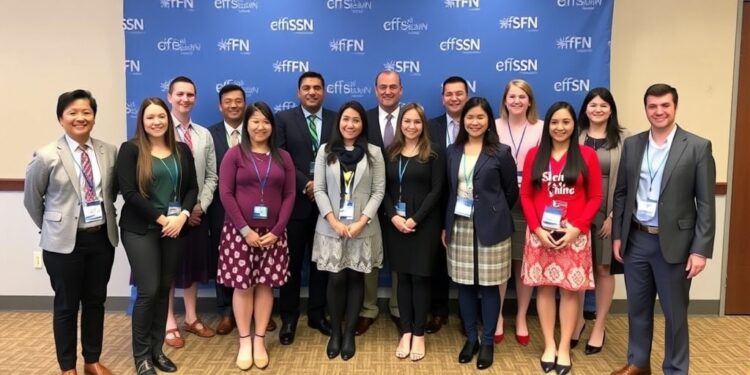The Society for Neuroscience (SfN), a prominent organization dedicated to advancing the understanding of the brain and nervous system, has recently announced the selection of 10 distinguished individuals as the Early Career Policy Ambassadors (ECPAs) for the year 2025. This program, designed to inspire emerging leaders in neuroscience advocacy, recognizes a group of talented individuals chosen from a competitive pool of applicants. The ambassadors were selected not only for their commitment to advocating on behalf of the scientific community but also for their willingness to expand their knowledge and skills in effective advocacy.
The ECPA program is a 10-month initiative that aims to equip young scholars with the tools necessary for successful advocacy efforts in various domains, particularly those related to neuroscience funding and policy. Through participation in this program, ambassadors will engage in a systematic development of advocacy skills that can be utilized to communicate pressing issues in neuroscience effectively. They will learn the importance of scientific communication and the vital role it plays in garnering support for research initiatives and funding.
The selected ambassadors include a diverse representation of individuals from various institutions and geographical locations, indicating the SfN’s commitment to inclusivity and diverse perspectives. Each chosen ambassador comes with a unique background and set of experiences, contributing to a rich tapestry of advocacy potential. The names of the ambassadors, including Izan Chalen from the University of Illinois Urbana-Champaign and Nicole D’Souza from the University of California, Riverside, reflect a range of career stages and research interests. Their selection highlights the importance of early-career researchers in shaping the future of neuroscience advocacy.
During the ECPA program, these ambassadors will have opportunities to enhance their understanding of the political landscape surrounding science funding. They will engage with policymakers, learning firsthand how to convey the importance of neuroscience research to decision-makers. This interaction is crucial in fostering a culture that appreciates the significance of scientific inquiry and its implications for health and society. Ambassadors will also be encouraged to undertake advocacy-related activities in their respective communities, thereby extending their learning beyond the confines of the program.
An essential component of the ECPA program is its focus on creating a strong network of scientific advocates. The program aims to cultivate long-term relationships among participants, which can be instrumental as they progress in their careers. By fostering connections among early-career researchers, the SfN hopes to build a robust support system that will empower ambassadors to continue advocating for neuroscience even after the program concludes. This holistic approach to advocacy training sets the ECPA program apart, creating a foundation for sustained engagement in the scientific community.
As the selected ambassadors prepare to embark on their journey, they will not only gain insights into the mechanism of advocacy but will also become part of a larger dialogue surrounding neuroscience and its societal implications. This program emphasizes the relevance of neuroscience research in addressing critical issues like mental health, neurological disorders, and cognitive function. By highlighting these connections, the ambassadors will become powerful messengers of the importance of neuroscience to the broader public.
In addition to personal development, the ambassadors will also work on projects aimed at enhancing the visibility of neuroscience research. One of the program’s goals is to encourage these young leaders to advocate for increased funding, policy changes, and heightened public interest in neuroscience. As they undertake projects in their institutions and communities, the ambassadors will devise strategies to engage and inform stakeholders about the impact of neuroscience. This initiative can potentially lead to increased advocacy efforts, raising awareness, and securing greater funding for critical neuroscience research.
Communicating neuroscience effectively is paramount in overcoming the challenges posed by misinformation and the general public’s lack of understanding of scientific processes. The ECPA program equips ambassadors with essential communication skills to convey complex ideas in an accessible manner. They will learn how to craft compelling narratives that resonate with diverse audiences, making the case for research funding and support clearer and more impactful. As they hone these skills, ambassadors will be better prepared to share their passion for neuroscience with the public, thus fostering a culture of appreciation for scientific advancements.
Moreover, the importance of advocacy in science cannot be overstated. Advocacy plays a pivotal role in shaping policies that support research funding and the advancement of scientific knowledge. As emerging leaders in this field, ECPAs have a unique opportunity to influence the future of neuroscience, ensuring that critical issues receive the attention they deserve. By participating in advocacy efforts, the ambassadors will inhabit a space where they can generate meaningful change and inspire their peers in the scientific community.
In conclusion, the 10 selected Early Career Policy Ambassadors for 2025 represent an extraordinary opportunity for innovation and engagement in the field of neuroscience. Through their participation in the ECPA program, they will gain invaluable skills in advocacy, networking, and communication. The advancement of neuroscience as a field depends on such initiatives that empower young leaders to take charge of their careers while advocating for the greater good of the scientific community and society at large. As the program unfolds, the ambassadors will contribute to a more informed and advocacy-driven neuroscience community.
By nurturing these early-career researchers, the Society for Neuroscience underscores the critical need for informed advocates who can articulate the value and importance of neuroscience research across various platforms. The journey begins for these ambassadors, setting the stage for a future where the scientific community is better understood and funded.
Subject of Research: Neuroscience Advocacy
Article Title: Society for Neuroscience Selects 2025 Early Career Policy Ambassadors
News Publication Date: [Not Provided]
Web References: [Not Provided]
References: [Not Provided]
Image Credits: [Not Provided]
Keywords: Neuroscience, Advocacy, Early Career Policy Ambassadors, Science Funding, Society for Neuroscience




